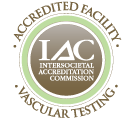Vascular Surgery
Vascular Surgery – Are You A Candidate?
Vascular surgery is a highly specialized branch of medicine that treats blood vessel and lymphatic (circulatory or vascular) conditions. A vascular surgeon is trained to provide you with complete treatment which includes counseling, medical treatment and reconstructive vascular surgery. Don’t neglect a vascular disease; it can cause severe disability or even death.
Who Needs Vascular Surgery
Vascular surgery includes surgery of the aorta, carotid arteries, and lower extremities. It may be recommended to treat a variety of conditions including:
- Strokes or mini-strokes
- Abdominal aortic aneurysm (AAA)
- Varicose veins
- Venous ulcers
- Peripheral arterial disease (PAD)
- Peripheral artery aneurysms
- Acute limb ischaemia
- Thoracic aortic aneurysms
- Gangrene of the limbs
- Deep vein thrombosis (DVT)
- Blood clots
- Hemodialysis access
- Treatment of vascular malformations
- Sudden loss of bowel circulation (mesenteric ischemia)
- A sudden onset of coldness, paleness, pain, numbness or weakness in your limbs
- Blood vessel injuries caused by an accident
- Diabetic foot infection
- And more
Treatments are typically classified into emergencies, urgent and non-urgent, in order to prioritize cases.
What are the Risks Involved in Vascular Surgery?
Vascular surgery is typically recommended when a patient cannot be treated by non-surgical or less invasive procedures. As with all surgeries, there is always a certain amount of risk. Some of these risks include bleeding, heart attack and stroke. It is important to discuss them with your vascular surgeon. If you are a smoker, suffer from high blood pressure, have a chronic lung or kidney disease, or other illnesses, you are at a greater risk of developing complications during and after surgery.
The success rate for vascular surgery also depends on a number of individual factors which may influence your decision on whether to have it or not.
Choosing your Vascular Surgeon
When left untreated, vascular disorders often lead to serious problems such as stroke or heart attack. Vascular surgery and treatment restores adequate blood flow reducing your risk of further complications. A vascular surgeon is trained in the diagnosis and management of diseases affecting most the vascular system, with the exception of the heart and brain.
The Vascular Experts is one of the largest groups of board-certified vascular surgeons in the country. You can be confident that we will provide you with personalized attention and expert care. Each of our board-certified surgeons has specifically trained in vascular treatment and care for over 7 years prior to starting practice. These surgeons maintain surgical privileges at local hospitals.
Take advantage of our state-of-the-art facilities to diagnose and manage your condition. We deal with both simple and complex cases, and use the latest resources to treat you. We also conduct as many tests and procedures in our facility as possible, for your convenience and comfort. Our vascular surgeons are supported by a dedicated staff all of whom are dedicated to providing you with the best patient experience.



